- Home
- Kim Newman
The Man From the Diogenes Club Page 4
The Man From the Diogenes Club Read online
Page 4
Now it hit him again.
There were monsters.
‘Maybe we can get to the bottom of it all by morning.’
They were on the seafront. The pier was in sight.
* * *
Because of the lack of street lighting, it was easy to creep up on the pier. A checkpoint was set up by the turnstile. Three men in uniform manned the point. Barbed wire was strung around the admissions booth. The soldiers were smoking cigarettes. From somewhere, Vera Lynn sang ‘We’ll Meet Again’.
An aeroplane whine sounded overhead.
There was a shrill whistle.
‘An air raid,’ Jeperson said. ‘I doubt if that was part of the intended casting. It just came along with the package.’
A plane flew in from the Channel, a dark shape against black clouds, pregnant with bombs.
Jeperson signalled that they should proceed.
Fred tried to think away the painful tightness in his gut. If Jeperson and Vanessa weren’t afraid, he shouldn’t be. Of course, they hadn’t been here before.
A column of fire rose from up among the villas. It burned his eyes. Then the sound of the explosion hit. It was strong enough to make him stagger.
They walked rapidly towards the checkpoint.
The soldiers were craning, looking up at the fire.
‘Jerry blighter,’ one sneered.
‘Our ack-ack’ll bring him down,’ his mate said.
As if in reply, the crump of ground guns sounded. The earth was shaking. There were shellbursts in the sky, silhouetting the plane.
Fred was surprised by the soldiers’ faces. They were not old, like the men at the villa. They were young, familiar. The three yobs from the Jolly Glutton. Rupert still had his yellow scarf tucked into the neck of his khaki jacket. Twitch was sucking on his cigarette, eye in motion. Shoulders awkwardly unslung his rifle.
‘Who goes there?’ he barked.
Vanessa stepped forward.
‘Remember me?’
‘It’s a dangerous night to be out, miss,’ said Rupert Scarf, politely. ‘Best get down in the shelters.’
‘Are you in the theatre?’ Twitch asked, looking at her legs.
The three didn’t remember Vanessa. Fred thought they might not remember their own names, whatever they were.
‘We’re with the Ministry,’ Jeperson said, holding out a folded newspaper picked from a rubbish bin.
Rupert Scarf took the paper and looked at it.
Jeperson hummed again, a different pitch. Rupert Scarf looked at the paper and at their faces.
‘All in order, sir,’ he said, smiling, saluting.
Jeperson took back the paper and tucked it under his arm.
‘Let’s take a look at the problem then, shall we?’ he said. ‘If you could let us through.’
The three smartly dismantled the barrier.
‘Shan’t be a jiffy,’ Jeperson said, stepping onto the pier.
Fred looked at the Emporium, dimly outlined at the end of the promenade. Its glass roof had a slight greenish glow. He had a ‘Go Back Now’ feeling.
‘Are you coming?’ Vanessa asked.
‘Yes,’ Fred said, resolving.
They strolled towards the Emporium.
* * *
‘It feels as if we’re miles from the shore,’ Jeperson said.
He was right. Fred looked back. The fire up in the villas was under control. The bomber seemed to be gone. There was still a flicker from where the bomb had fallen.
‘What about those skinheads?’ Fred asked.
‘Caught up in the casting. Weak minds are prone to that. It’s like a psychic press-gang. It turns people into costume extras.’
‘I can’t say I miss the old versions.’
The sea sounded beneath them. An ancient susurrus.
The pier was such a fragile thing, an umbilicus connected to the shore.
Fred had to overcome an urge to bolt back.
‘This is definitely it,’ Jeperson said. ‘The flaw in the pattern. You can feel the atoms whirling the wrong way.’
Vanessa nodded.
They were at the Emporium. There was the dent where Ingraham had kicked. And the pane Jaffa had smashed. If it were daylight, he was sure he’d see the scorch-trail Jaffa left before he went over the side.
‘I don’t have to tell you to be careful, do I?’ Jeperson said, reaching in through the broken pane, opening the door. ‘Excelsior.’
Fred looked into the darkness. He followed Jeperson and Vanessa inside.
* * *
‘Someone’s cleared up,’ he said. ‘There should be bodies all over the place.’
Vanessa had a slim torch. She played light around the space. There were scrubbed and bleached patches on the floor. And some of the exhibits were under dust-sheets.
Jeperson looked at the storm trooper poster.
‘It’s all to do with the War,’ he said.
‘Even I’d worked that out,’ Fred said. ‘It’s been a while since anyone bombed the South Coast from the air.’
‘A lot of people liked the War,’ Jeperson said, scratching his wrist. ‘I don’t think I did, though. I can’t actually remember much of it. But it wasn’t anything I’d want to bring back.’
‘I can understand that.’
Vanessa ran torchlight across the exhibits. She spotlit a display Fred hadn’t noticed on his first visit. It was a set of caricature figures of Hitler, Goebbels and Mussolini. Hitler was child-sized and cut off at the waist, Goebbels a rat-bodied pet in Hitler’s top pocket, and Mussolini a towering fat clown with an apple-sized red head and a conical Punchinello hat.
‘These fellows, for instance,’ Jeperson said. ‘I don’t miss them one bit.’
Hitler’s mask crinkled in a scowl as its wearer escaped from the display. The creature walked very rapidly on its hands, detaching itself from the base. It was a legless torso.
Half-Hitler brushed past Vanessa, screeching, and slid through a panel. It had left Rat-Goebbels behind, rodent feet curled up, horrid little eyes glittering.
Man Mountain Mussolini quivered, a ton of jelly poured into a barrage-balloon uniform. His belly rumbled, and a falsetto laugh emerged from his circular lipsticky mouth.
Fred looked around. Vanessa moved the torchlight. Panels were sliding upwards. Boots shone. Black jackboots. Then grey-uniformed knees. There were half a dozen panels. Behind them were men – mannequins? – in Nazi uniform.
Rat-Goebbels right-sided himself and scurried towards a pair of boots, nestling between them like an affectionate pet.
The panels were above leather belts. Swastikas and Iron Crosses showed on grey chests. Luger pistols and Schmeisser machine guns were pointed.
Man Mountain Mussolini, still laughing like a eunuch, rolled back and forth on his belly. His legs were normal-sized, useless with his gut-bulk, stuck out of his egg-shaped body like broken tree-branches.
Faces showed. Faces Fred knew. The Boys. Jaffa’s nose was smudged with soot, his cheeks burned to the bone, his eyes dead under the rim of his storm trooper helmet. The others were similarly transformed. Ingraham in an SS uniform, Doggo a regular soldier. Oscar’s face was crudely stitched back on, forehead sewn to his Afrika Corps cap, skin hanging slack like a cloth mask.
Half-Hitler advanced from between two rows of Nazi skins, using its arms like crutches, inching forwards its truncated torso. Its face was not a mask, but coated in a transparent fungus that exaggerated the familiar features. The homunculus set itself down and crossed its arms, tottering back and forth a little. The storm troopers snapped off perfect Nazi salutes.
‘Sieg Heil,’ they shouted, ‘Heil Hitler.’
‘You’ll excuse me if I don’t respond in kind,’ Jeperson said. ‘But I could never stand you, you little sneak.’
He drew back his banana boot as if converting a rugby try and kicked Half-Hitler in the face. The diminished Führer tipped over backwards, outsize hands slapping the floor, and overturned completely like a chimpa
nzee on a trapeze, winding up face down and arms flailed out.
Safety catches clicked off. Guns fired.
* * *
Fred grabbed Vanessa round the waist and threw himself at the floor. Together, they rolled behind the row of penny-in-the-slot machines, inches ahead of the line of bullet-pocks that raked the floorboards.
The space was too enclosed for the Nazi zombies to get much accurate use of their guns. Bullets ricocheted and spanged around. Doggo took one in his face and staggered back. Black goo leaked from the hole, but he wasn’t seriously hurt.
Ingraham kicked aside the penny-in-the-slot machines.
Fred tried to put his hands up.
Ingraham raised his Luger.
The gun writhed. Its metal parts contracted as if the mechanism were about to sneeze. It was partly a gun, but infused with the life of a small rodent.
The gun-thing coughed. Fire belched. Slow enough to see, a bullet squeezed out of the barrel and sped towards them, a blob of flaming jelly.
It spattered against his chest, stinging through his shirt. He brushed the fiery glop away, feeling the flames curling around his fingers, and scraped it off on to the floor.
Ingraham’s pistol growled at them.
Jaffa came over. He held Jeperson by one arm twisted playground-bully-style up behind his back. A silver-bladed dagger was held at Jeperson’s throat, steel quivering with a life of its own. The zombie indicated Fred and Vanessa should surrender. Fred stood up, trying to keep his body in front of Vanessa.
Jaffa smiled. His burned lips made an expression Fred remembered from when the Nazi was King Skin.
‘You’re enjoying this, aren’t you, Kevin?’
In the burned-out eyes anger glowed.
Half-Hitler scuttled over, and bit Jeperson’s leg like a terrier. Its teeth couldn’t get through the banana boot.
At a nod from the Führer, Fred was pulled away. The Nazi homunculus looked Vanessa over, little black eyes excited. She tried not to show disgust.
‘Eva,’ Half-Hitler breathed, besotted.
Man Mountain Mussolini rolled over to look. Other fascist freaks came out of the shadows. A pig-faced Goering, warty wings folded over his Luftwaffe tunic. Himmler-and-Hess Siamese twins, joined at the waist, Hieling with all available arms. A snake-bodied, fork-tongued Martin Bormann. An armoured Rommel, bony tank-plates coating his body, desert camouflage smearing his face. A werewolf Heydrich, cheeks and hands pierced by dozens of hooks.
They all gathered, looking at Vanessa.
Half-Hitler crawled around her legs, as if inspecting a horse. Vanessa looked down at the little creep. It retreated and barked an order.
The Nazi Boys raised their machine guns. Fred opened his mouth to protest. Guns chattered, pouring liquid fire out of hosepipe barrels. It washed against Vanessa, burning swatches of her clothing, hanging around her hair.
Where the fire burned, she was transformed. A cloak of flame enveloped her. White boots became black. Straps grew around her chest. A jewelled swastika hung at her throat. Her hair, a living thing, coiled into a braid, clinging to the back of her head like a cap. She twisted as she turned, resisting the metamorphosis, but the zombies kept pouring the changing fire at her.
Half-Hitler’s eyes shone.
The light went out in Vanessa’s face. The flame fell away from her. She was the same woman, but turned into a Nazi pin-up.
Jeperson was mumbling furiously, trying to call up some counter-charm.
Half-Hitler gave another order.
Eva-Vanessa uncoiled a short whip and struck Jeperson in the face, breaking his concentration. The Nazi monsters laughed. Jeperson went limp, and Jaffa dropped him.
Half-Hitler jumped up and down on its waist-stump, chortling with glee. Eva-Vanessa picked it up as if it were a child, and hugged it. They kissed. Fred felt sick.
‘Today the pier,’ Goebbels snickered; ‘tomorrow the world.’
Jeperson got up onto his knees. As he fell, he had snatched something from Jaffa’s belt. Now he opened his hand. It was a grenade. He opened his other hand. There was the pin.
Time froze.
Then everyone was scrambling out of the way.
Jeperson let the grenade roll on the floor.
Fred was kicked about by Nazi boots. He found himself behind the execution machines again.
The grenade didn’t so much explode as suck light and matter in from all around. It gathered into a heavy black ball and fell through the floor.
Fred saw the dark sea frothing below. Jeperson stood over the lip of the hole and stepped into it, plunging towards the water.
Gunfire raked the room.
Fred followed Jeperson, without thinking.
He tumbled badly and hit the sea as if it were a tossing sheet of iron. Cold water slammed him in the face and tried to shove him under.
* * *
He woke up on the beach, with water being forced out of his lungs. His mouth was full of the sick taste of too much salt. And he was as cold as he had ever been, racked with spasms of shivering.
‘Welcome back,’ Jeperson said. ‘Thought you’d upped stumps for a minute.’
Fred rolled over on the sand and water poured out of him.
Looking out to sea, Fred saw that the Emporium at the end of the pier was lit up with fairy lights. It seemed like a jewelled palace in the darkness.
‘The ARP won’t like that,’ Jeperson commented.
‘What is going on here?’ Fred asked.
‘A very bad business,’ Jeperson said, concerned. ‘Very bad business indeed.’
People stood around, with rifles.
A man came forward wearily. Sir Giles.
‘Oh dear,’ he said. ‘We shall have to get you two dried off.’
Fred was picked up. He recognised the ARP man he had shoved earlier. He was too weak to resist.
‘A cup of tea might help,’ said Sir Giles.
* * *
They were back in the study at The Laurels. All that could be found for Fred was a naval uniform, left behind by Michaelsmith’s brother. Jeperson had a change of clothes (or a dozen) in the Rolls. He now wore a tiger-striped frock coat and aquamarine knee-britches, a violet kaftan shirt, and red riding-boots. His hair was still damp.
Sir Giles sat in his favourite armchair while Marshall Michaelsmith, in an orderly’s uniform, served mugs of hot tea. Fred was grateful for that. Jeperson leaned forwards, eyes blazing, fixing Sir Giles with a stern schoolmaster’s gaze.
‘What were you thinking of, Giles?’
The old soldier shrivelled in his chair.
Finally, feebly, he said, ‘It was decimalisation.’
‘What?’ Jeperson shouted.
Sir Giles was embarrassed, but defiant.
‘Decimal coinage, you know. The new money. I can never get it straight, all these pence and no shillings. The new coins don’t mean anything. They’re like counters in a child’s game. That was the last straw. Not just changing the money, of course. But everything it meant. All the other changes. The Common Market coming up. Motorways. Everything plastic. High-speed inter-city trains. Racialist violence. Hot-pants. Instant soup. Hire purchase. Everything’s cheapened, somehow. Since the War.’
‘Regrettable, perhaps. But what about heart transplants? A man on the moon?’
‘The pill?’
Jeperson sat back, and shook his head. ‘Have you forgotten how you felt in 1930? That deadening weight of history, of the way things have always been. Why do you think Mr Jeperson chose me, passed on the responsibilities? Because I can still embrace the change, the chaos. I can still accommodate.’
‘This is different,’ Sir Giles said.
‘No, it’s the same. It’s just that you have resources. How wide is the casting?’
‘Just the town.’
‘Who is the focus?’
Sir Giles hesitated. But Michaelsmith said, ‘The missus.’
Jeperson looked at the man.
‘She dreams of the
old times,’ Michaelsmith explained.
‘Effective dreams? Reality-changing dreams?’
Sir Giles nodded.
‘You know how dangerous that game is. And you had to pick the War.’
‘Why not?’ Sir Giles’s defiance was growing. He needed to defend himself. ‘We were all working together, all differences set aside. Everyone was prepared to sacrifice for everyone else. It was our finest hour.’
Jeperson thought for a moment.
‘And what about the air raids? The pier?’
‘An impurity in the casting,’ Sir Giles said. ‘It will be rectified.’
‘No,’ Jeperson said. ‘Not an impurity, not a mistake. It was inevitable. You can’t just have back the things you liked about the War. You want ITMA on the wireless and duchesses cosying up to shopgirls in the shelters, but that means you have to have the monsters. Can you really have forgotten what the War was like for most of Europe? For Britain, even.’
Jeperson rolled up his cuff to show his camp tattoo.
Sir Giles looked down at the carpet, ashamed.
Jeperson was contemptuous. ‘And all because you didn’t want to learn decimal coinage?’
Fred thought of Vanessa, transformed and perhaps lost.
‘Couldn’t we just wake his wife up?’ he suggested.
Sir Giles, Michaelsmith and Jeperson looked at him, surprised that he had spoken.
‘That might seem on the surface to be the best bet,’ said Jeperson, ‘but there are people alive in the vortex of evil at the end of the pier. We can banish the dream with a hearty breakfast, but they’ll all be sucked back into whatever netherworld Giles and his Committee called the War up from.’
Fred could well do without Jaffa and the Boys.
But Vanessa?
‘I’m very much afraid that we’re going to have to go back to the Emporium.’
‘We got hammered last time.’
‘That was an exploratory mission. This time, we’ll be prepared.’
Sir Giles looked up.
‘We’ll do what we can, Richard.’
‘I should think you will,’ said Jeperson, chipper but stern. ‘First, you must have some young persons about town?’
Sir Giles nodded.
‘Excellent. You Committee men will need to loot your sons’ wardrobes. And you’ll have to hook up the air-raid sirens to a gramophone. Oh, and no Vera Lynn.’

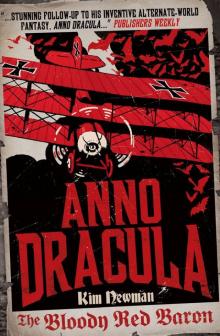 The Bloody Red Baron
The Bloody Red Baron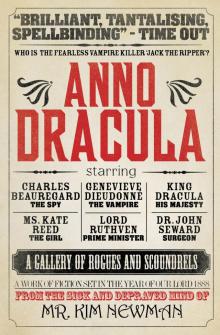 Anno Dracula
Anno Dracula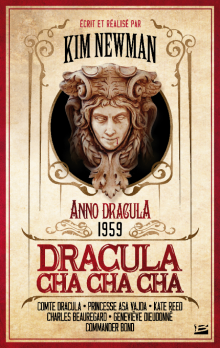 Dracula Cha Cha Cha
Dracula Cha Cha Cha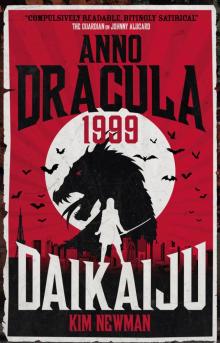 Anno Dracula 1999
Anno Dracula 1999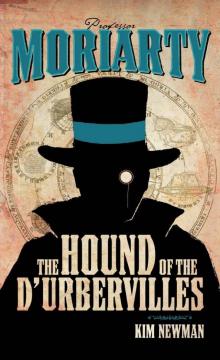 Moriarty: The Hound of the D'Urbervilles
Moriarty: The Hound of the D'Urbervilles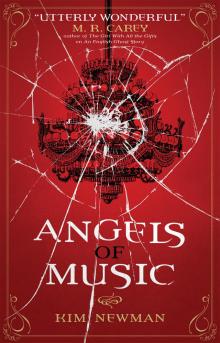 Angels of Music
Angels of Music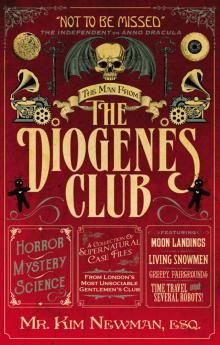 The Man From the Diogenes Club
The Man From the Diogenes Club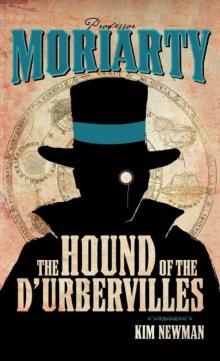 Professor Moriarty: The Hound Of The D’urbervilles
Professor Moriarty: The Hound Of The D’urbervilles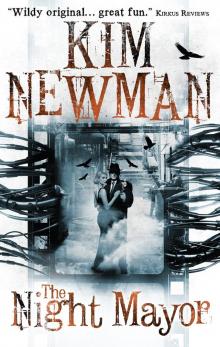 The Night Mayor
The Night Mayor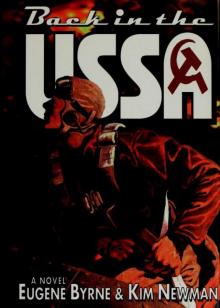 Back in the USSA
Back in the USSA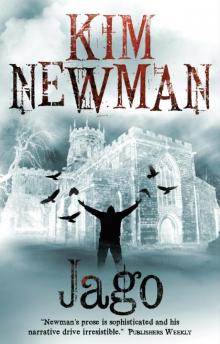 Jago
Jago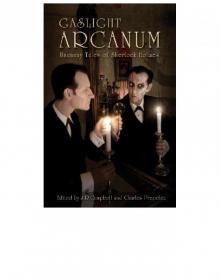 Gaslight Arcanum: Uncanny Tales of Sherlock Holmes
Gaslight Arcanum: Uncanny Tales of Sherlock Holmes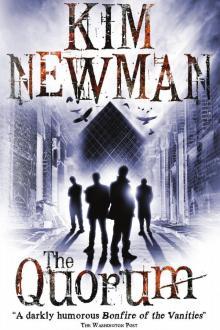 The Quorum
The Quorum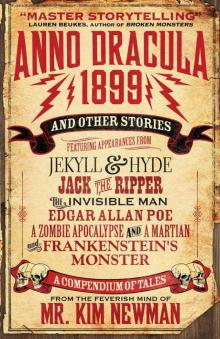 Anno Dracula 1899 and Other Stories
Anno Dracula 1899 and Other Stories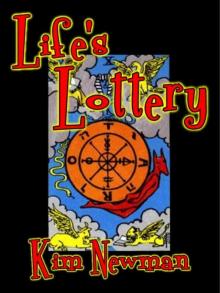 Life's Lottery
Life's Lottery The Secrets of Drearcliff Grange School
The Secrets of Drearcliff Grange School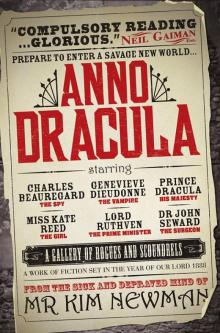 Anno Dracula ad-1
Anno Dracula ad-1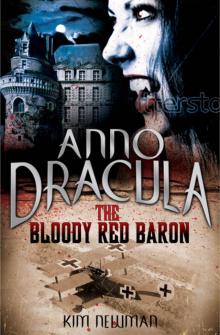 The Bloody Red Baron: 1918 ad-2
The Bloody Red Baron: 1918 ad-2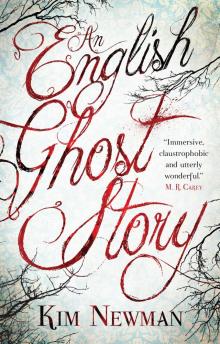 An English Ghost Story
An English Ghost Story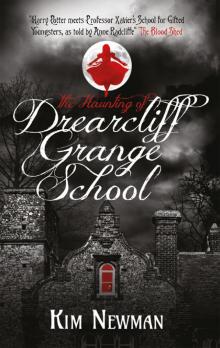 The Haunting of Drearcliff Grange School
The Haunting of Drearcliff Grange School The Other Side of Midnight
The Other Side of Midnight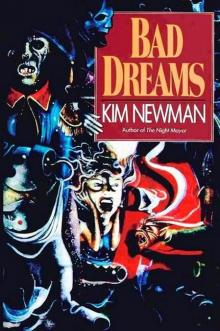 Bad Dreams
Bad Dreams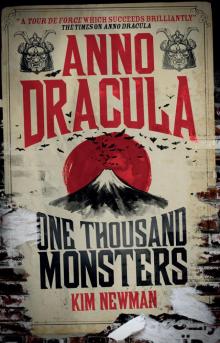 Anno Dracula--One Thousand Monsters
Anno Dracula--One Thousand Monsters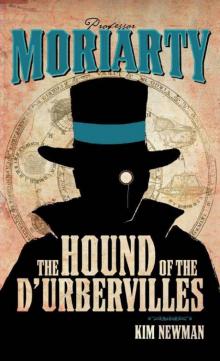 The Hound Of The D’urbervilles
The Hound Of The D’urbervilles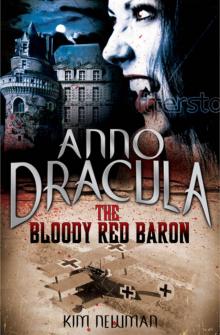 The Bloody Red Baron: Anno Dracula 1918
The Bloody Red Baron: Anno Dracula 1918